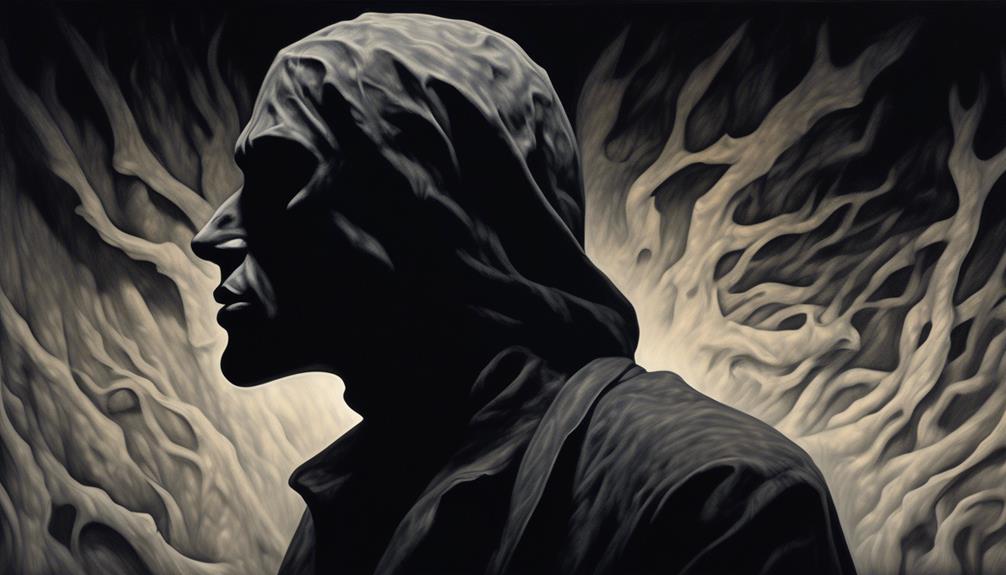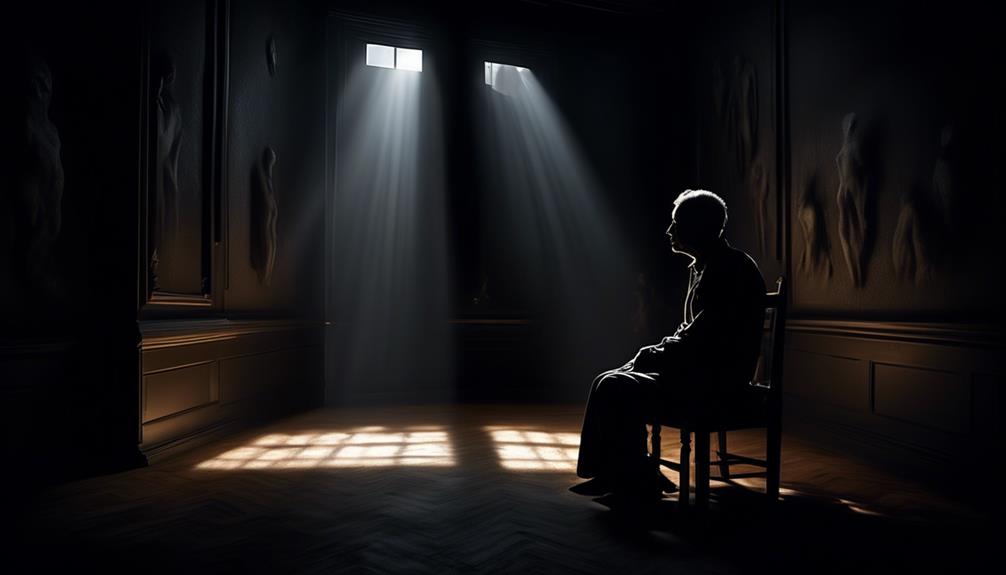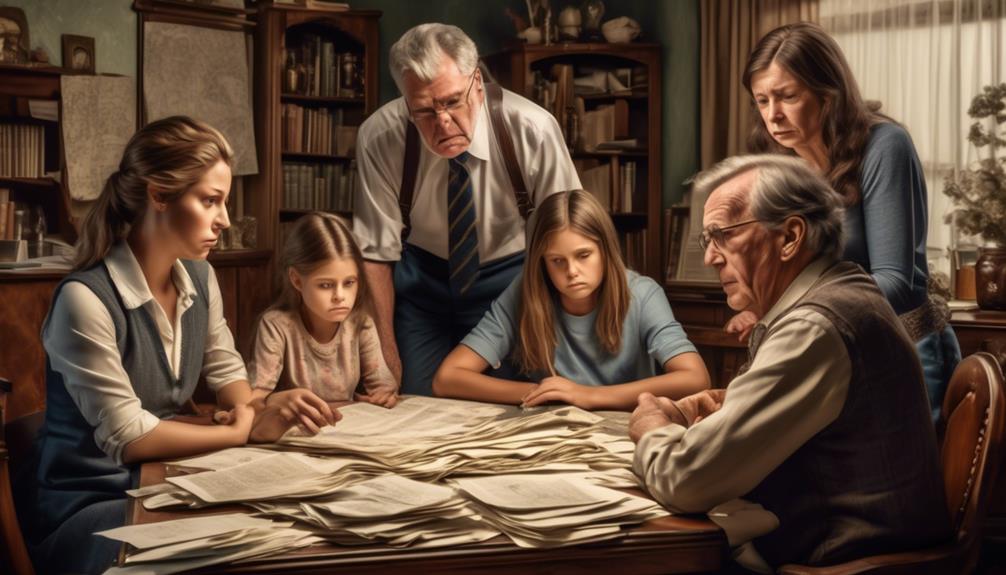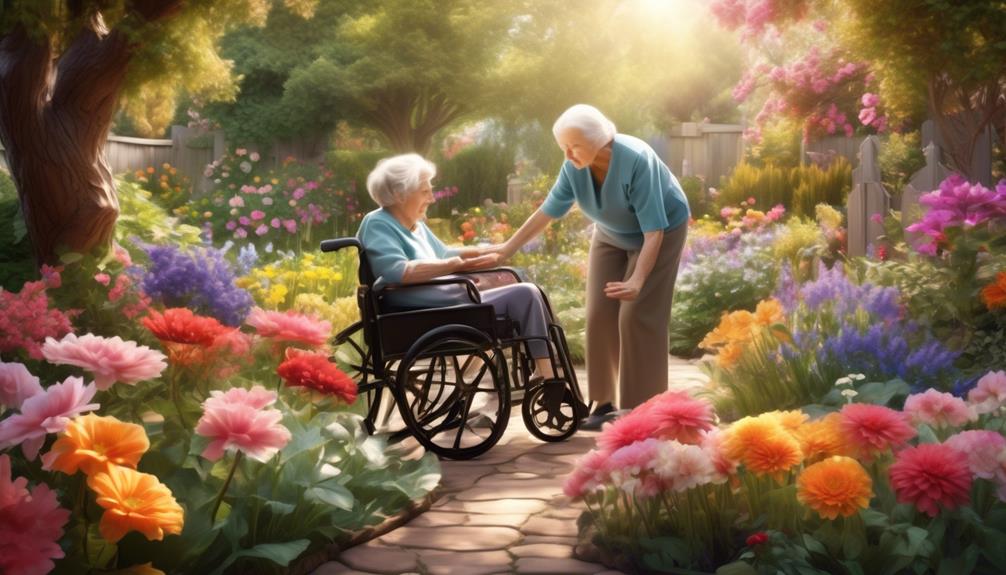The mind holds immense power, capable of transforming hell into heaven and vice versa.
When considering the question of whether depression can cause hallucinations, the intricate relationship between mental health and perception comes to light.
The interplay of emotions and cognition in the context of depression can lead to a spectrum of experiences that may surprise many.
But how exactly does this connection unfold, and what implications does it hold for those navigating the complexities of mental well-being?
Let's explore the nuanced terrain where depression and hallucinations intersect, shedding light on a topic that warrants thoughtful consideration and understanding.
Key Takeaways
- Depression can lead to hallucinations, known as psychotic depression.
- Hallucinations can cause fear, anxiety, and impaired daily functioning.
- Treatment involves a combination of antidepressants, antipsychotics, and comprehensive approaches.
- Early identification and intervention are crucial to prevent worsening symptoms and suicidal thoughts.
Understanding Depression and Hallucinations
When exploring the connection between depression and hallucinations, it becomes evident that understanding their interplay is crucial for effective treatment and management.
Depression, a condition many of us face, can lead to hallucinations, where individuals perceive things that aren't there. These hallucinations often reflect the individual's depressed mood and may include delusions – false beliefs that can be distressing. This combination of depressive symptoms with hallucinations is known as psychotic depression, a serious aspect of mental health that requires attention.
Treatment typically involves a mix of antidepressants and antipsychotics to address both the depressive and psychotic components. However, if left untreated, the risk of suicidal thoughts and impaired daily functioning increases significantly.
Factors like genetics, environment, and trauma can contribute to this condition, emphasizing the need for early identification and intervention. By recognizing the signs, providing appropriate treatment, and offering ongoing support, we can help individuals experiencing depression and hallucinations navigate towards a path of recovery and improved mental well-being.
Link Between Depression and Hallucinations

Understanding the connection between depression and hallucinations sheds light on the intricate relationship between these two mental health phenomena. Hallucinations in depression, especially in cases of psychotic depression, can be distressing and involve sensory perceptions not based in reality. They're often auditory, like hearing voices or sounds that others don't hear, and can be linked to feelings of guilt, worthlessness, or hopelessness.
Individuals with a family or personal history of depression or psychotic illnesses are at higher risk of experiencing hallucinations during depressive episodes. The severity and frequency of these hallucinations vary among individuals, impacting their overall mental well-being.
Treatment for depression with hallucinations typically involves antidepressants, antipsychotic medications, therapy, and support. Effective management of psychotic symptoms may also include electroconvulsive therapy in severe cases.
Recognizing the link between depression and hallucinations is crucial for providing comprehensive care to those experiencing these complex mental health conditions.
Psychological Impact of Hallucinations in Depression
The psychological toll of experiencing hallucinations in the context of depression is profound and can deeply affect an individual's well-being. When someone with depression also experiences psychosis, the impact can be even more significant.
Here are four key points to consider regarding the psychological impact of hallucinations in depression: Hallucinations in depression can often exacerbate feelings of isolation and confusion, leading individuals to question their sense of reality. This can intensify existing symptoms and make the disorder even more difficult to manage. Additionally, the distortion between hallucinations and personal experiences may create challenges in distinguishing between what is real and imagined, further complicating the recovery process.
- Challenges in Differentiating Reality: Individuals with depression and psychosis may struggle to differentiate between what's real and what's a hallucination, leading to increased confusion and distress.
- Heightened fear and anxiety: Hallucinations, such as hearing voices or seeing things that aren't there, can instill fear and anxiety in those experiencing them, exacerbating the already present symptoms of depression.
- Impact on Daily Functioning: Managing hallucinations in the context of depression can significantly impair a person's ability to carry out daily tasks, maintain relationships, and engage in self-care practices.
- Need for Comprehensive Treatment: Addressing the psychological impact of hallucinations in depression requires a comprehensive approach, including medication management, therapy, and support from mental health professionals.
Treatment Approaches for Depression-Related Hallucinations

Experiencing hallucinations within the context of depression necessitates a tailored approach to treatment that addresses both the underlying depressive symptoms and the accompanying psychotic manifestations. When dealing with psychotic depression, immediate medical attention is crucial, often involving hospitalization for close monitoring by mental health professionals. Treatment typically combines antidepressants and antipsychotic medications to target both the mood disorder and psychotic symptoms. Antipsychotic medications like Abilify and Seroquel may be used temporarily to help regulate perception. In cases where medications are ineffective, electroconvulsive therapy (ECT) could be considered. Psychotherapy, particularly cognitive-behavioral therapy (CBT), can also be beneficial in managing symptoms and fears associated with depression-related hallucinations. It is essential for individuals with depression with psychosis to undergo a comprehensive psychiatric evaluation to confirm the presence of both depressive and psychotic symptoms, ensuring an appropriate treatment plan is implemented.
| Treatment Approaches for Depression-Related Hallucinations | |
|---|---|
| Immediate medical care for psychotic depression, including hospitalization | Combination of antidepressant and antipsychotic medications |
| Antipsychotic medications like Abilify, Seroquel used temporarily | Electroconvulsive therapy (ECT) considered if medications fail |
| Psychotherapy, particularly cognitive-behavioral therapy (CBT) | Thorough psychiatric evaluation to confirm symptoms |
Coping Strategies for Managing Depression-Induced Hallucinations
Seeking professional guidance is paramount when developing effective coping strategies for managing depression-induced hallucinations. Here are some practical coping strategies to help navigate through these challenging experiences:
- Consult with a mental health professional: A clinical evaluation is crucial to determine the best treatment plan, which may include medication and therapy tailored to your specific needs.
- Engage in self-care practices: Prioritize activities that enhance your well-being, such as maintaining a balanced diet, regular exercise, and sufficient sleep to support your mental health.
- Foster a supportive environment: Surround yourself with understanding individuals who can offer emotional support and aid in managing your symptoms effectively.
- Learn and apply coping mechanisms: Practice mindfulness and relaxation techniques to alleviate stress and diminish the frequency and intensity of hallucinations.
Frequently Asked Questions
How Long Can Depressive Psychosis Last?
Depressive psychosis can last for several months, with the duration varying for each individual.
It's crucial to seek professional help for accurate diagnosis and effective treatment.
Antidepressant and antipsychotic medications, along with psychotherapy, are common treatment options.
Regular follow-up care is essential for recovery.
Can Major Depression Turn Into Schizophrenia?
Yes, major depression can sometimes lead to psychotic symptoms similar to schizophrenia, known as psychotic depression. This condition involves a combination of depressive symptoms and features of psychosis like hallucinations and delusions.
It's crucial to differentiate between the two disorders as they require different treatment approaches. Seeking professional help for accurate diagnosis and appropriate interventions is essential for managing these complex mental health conditions effectively.
What Does a Psychosis Episode Look Like?
When facing a psychosis episode, it can feel like wandering through a dense fog where reality blurs with imagination. Hallucinations and delusions dance in our minds, creating a surreal world that's both captivating and terrifying. It's a storm of confusion and fear, where the line between what's real and what's not fades away.
In these moments, support and understanding are our lifelines to navigate back to clarity and stability.
Can You Live a Long Life With Depression?
Yes, we believe living a long life with depression is possible.
With proper treatment, support, and self-care, individuals can manage their depression effectively and lead fulfilling lives.
It's essential to seek help from healthcare professionals, adhere to treatment plans, engage in therapy, maintain a healthy lifestyle, and cultivate a strong support system.
Conclusion
In conclusion, depression can indeed cause hallucinations, leading to a challenging and distressing experience for those affected.
By recognizing the link between depression and hallucinations, seeking appropriate treatment, and utilizing coping strategies, individuals can navigate through this difficult journey towards healing and recovery.
Remember, with support and perseverance, there's hope for a brighter tomorrow amidst the darkness of depression-induced hallucinations.









